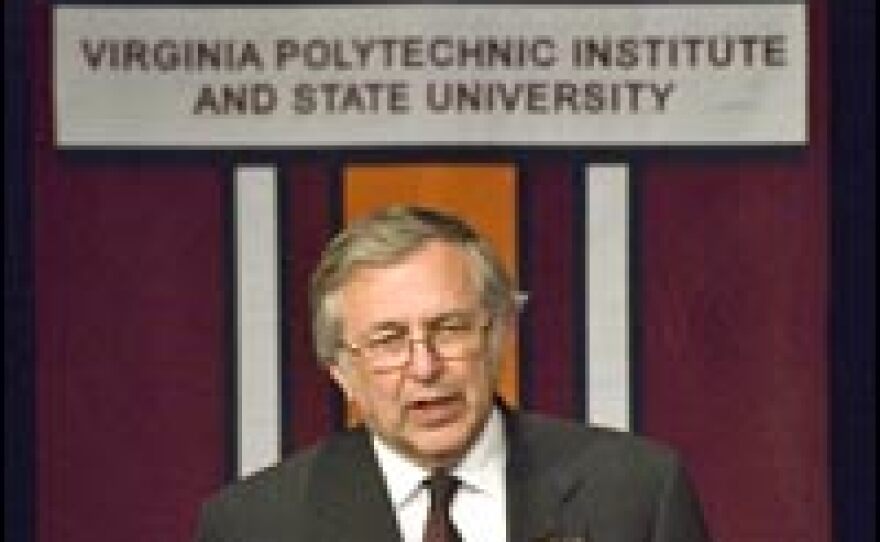

Look out the window of Charles Steger's office at Virginia Tech, and you can just see the edge of the simple memorial to the 32 students and faculty who died at the hands of Seung-hui Cho on April 16, 2007.
Most of the time, someone is there, day or night, pausing by one or another of the stones engraved with a name.
So much changed that day last year, including the idea of what it means to be a college president: Steger, president of Virginia Tech, had to quickly shift from academic, fundraiser and booster to crisis manager.
"Even today, you can't believe it actually happened, you know," he says about the campus shooting. "There's something about it."
No Frame of Reference
Steger, 60, grew up in Richmond and is an architect by training. Except for a short stint practicing architecture for a firm, he's been at Tech since he was 18 years old. He is a private person, hard to draw out.
"I like people, you know. It's not that I wish to be withdrawn from people. But I try to spend a little time every day alone and just sort of, as the Buddhists would say, kind of be centered," he says. "Once you can do that, you can cope with most anything that comes along."
Steger became known to most people a year ago, when reporters shouted questions at him during a news conference held just hours after the shootings.
After Cho shot Emily Hilscher and Ryan Clark in a dormitory, the campus police figured, wrongly, that the crime was domestic and isolated. So they didn't try to warn the campus that a killer might be on the loose.
About two hours later, Steger got word that his police were questioning a suspect, Hilscher's boyfriend.
"I'm thinking, thank God, this is a horrible tragedy. How do we deal with it?" Steger asks.
That's about the time that Cho was chaining the doors at Norris Hall.
Then Steger saw the SWAT team running past his office to Norris. He heard gunshots.
"It's hard," Steger says. "You have no frame of reference for this, and certainly I didn't."
And there wasn't much time for him to get one. In 11 minutes, Cho killed 30 more people and wounded more than two dozen others.
'I Never Considered Resigning'
Shortly after the shootings, the school had a room set aside for families of the victims, "and I was there a couple of times a day," Steger says. "You don't know what to say. What can you say?"
Some families read Steger's muted style as unfeeling and defensive.
And for some people, Steger will always be the president who didn't warn his students after the first shooting.
There are still calls by some families that Steger should resign. He says he understands, but he doesn't agree.
"That sort of shock and anger and looking for some reason why this horrible thing happened, it's a very complicated problem, so you have to understand that," he says. "I never considered resigning."
Steger stands by his belief that he acted appropriately at the time, given the information he had in front of him.
At Home
Every month or so, Steger has lunch with students on campus at the Inn at Virginia Tech. He meets with a different group each time. The Inn is the same place families gathered last year.
At a recent lunch session, Steger is at home with his students and they are at home with him.
Junior Jillian Lytle tells him how recruitment tours have gone up this year, a surprise. There's talk about the under-funded library and questions about why there's only one Arabic language professor.
There are students who are down on Steger, who feel that he blew it. But others are fiercely protective of him.
After lunch, Steger shakes hands and disappears into the crowd.
Remembering
At the memorial, senior Ryan Smith walks the curve of 32 stones. Each has a flower or two beside it: a red rose, a yellow daffodil.
Smith says the people who criticize Steger don't know he bears the consequences of the shootings every day.
"A lot of times in the group settings he is very calm, he is very composed, and that's why he is our president," Smith says. "But sometimes, when you can just have a small side conversation, you can see the hurt."
Smith recounts a time last year when he and Steger cried together. They were talking about the moments when it all comes back.
"He said for him it was just sometimes when he's flying out and he looks out the window and he sees the world from a different perspective from that high up, and you realize just how fragile and yet how connected we are," Smith says. "And he said that silence and that looking down ... it gets to him."
Up there, all alone, Steger told him, is where it really hits him.
Copyright 2022 NPR. To see more, visit https://www.npr.org. 9(MDAzMjM2NDYzMDEyMzc1Njk5NjAxNzY3OQ001))







